
The School of Computer Science (SCS) at Carnegie Mellon University in Pittsburgh, Pennsylvania, US is a school for computer science established in 1988. It has been consistently ranked among the top computer science programs over the decades. As of 2022 U.S. News & World Report ranks the graduate program as tied for second with Stanford University and University of California, Berkeley. It is ranked second in the United States on Computer Science Open Rankings, which combines scores from multiple independent rankings.

Dabbala Rajagopal "Raj" Reddy is an Indian-born American computer scientist and a winner of the Turing Award. He is one of the early pioneers of artificial intelligence and has served on the faculty of Stanford and Carnegie Mellon for over 50 years. He was the founding director of the Robotics Institute at Carnegie Mellon University. He was instrumental in helping to create Rajiv Gandhi University of Knowledge Technologies in India, to cater to the educational needs of the low-income, gifted, rural youth. He is the chairman of International Institute of Information Technology, Hyderabad. He is the first person of Asian origin to receive the Turing Award, in 1994, known as the Nobel Prize of Computer Science, for his work in the field of artificial intelligence.
Swarm intelligence (SI) is the collective behavior of decentralized, self-organized systems, natural or artificial. The concept is employed in work on artificial intelligence. The expression was introduced by Gerardo Beni and Jing Wang in 1989, in the context of cellular robotic systems.

Francesco Mondada is a Swiss professor in artificial intelligence and robotics. He got a Master's degree in Microengineering at the EPFL in 1991 and a PhD degree in 1997. He is one of the creators of the Khepera and directed the design of the S-bot, the e-puck, the marXbot and the Thymio mobile robots. Together, these robots are mentioned in more than 9000 research articles. In particular the Khepera robot is a milestone in the field of bio-inspired and evolutionary robotics.
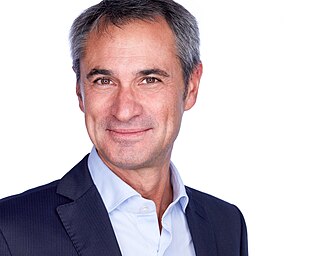
Dario Floreano is a Swiss-Italian roboticist and engineer. He is director of the Laboratory of Intelligent System (LIS) at the École Polytechnique Fédérale de Lausanne in Switzerland as well as the Swiss National Centre of Competence in Research (NCCR) Robotics.
Ekaterini Panagiotou Sycara is a Greek computer scientist. She is an Edward Fredkin Research Professor of Robotics in the Robotics Institute, School of Computer Science at Carnegie Mellon University internationally known for her research in artificial intelligence, particularly in the fields of negotiation, autonomous agents and multi-agent systems. She directs the Advanced Agent-Robotics Technology Lab at Robotics Institute, Carnegie Mellon University. She also serves as academic advisor for PhD students at both Robotics Institute and Tepper School of Business.
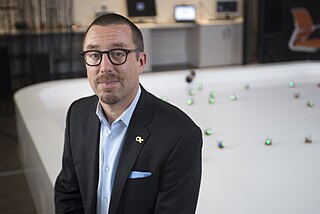
Magnus B. Egerstedt is a Swedish-American roboticist who is the Dean of the Henry Samueli School of Engineering at the University of California, Irvine. He was formerly the Steve C. Chaddick School Chair and Professor at the School of Electrical and Computer Engineering, Georgia Institute of Technology.

Manuela Maria Veloso is the Head of J.P. Morgan AI Research & Herbert A. Simon University Professor in the School of Computer Science at Carnegie Mellon University, where she was previously Head of the Machine Learning Department. She served as president of Association for the Advancement of Artificial Intelligence (AAAI) until 2014, and the co-founder and a Past President of the RoboCup Federation. She is a fellow of AAAI, Institute of Electrical and Electronics Engineers (IEEE), American Association for the Advancement of Science (AAAS), and Association for Computing Machinery (ACM). She is an international expert in artificial intelligence and robotics.
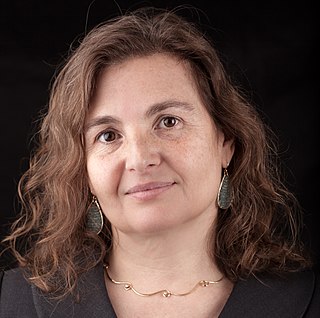
Daniela L. Rus is a roboticist and computer scientist, Director of the MIT Computer Science and Artificial Intelligence Laboratory (CSAIL), and the Andrew and Erna Viterbi Professor in the Department of Electrical Engineering and Computer Science (EECS) at the Massachusetts Institute of Technology.
Henrik Iskov Christensen is a Danish roboticist and Professor of Computer Science at Dept. of Computer Science and Engineering, at the UC San Diego Jacobs School of Engineering. He is also the Director of the Contextual Robotics Institute at UC San Diego.

Robotics is the branch of technology that deals with the design, construction, operation, structural disposition, manufacture and application of robots. Robotics is related to the sciences of electronics, engineering, mechanics, and software.
Maja Matarić is an American computer scientist, roboticist and AI researcher, and the Chan Soon-Shiong Distinguished Professor of Computer Science, Neuroscience, and Pediatrics at the University of Southern California. She is known for her work in human-robot interaction for socially assistive robotics, a new field she pioneered, which focuses on creating robots capable of providing personalized therapy and care that helps people help themselves, through social rather than physical interaction. Her work has focused on aiding special needs populations including the elderly, stroke patients, and children with autism, and has been deployed and evaluated in hospitals, therapy centers, schools, and homes. She is also known for her earlier work on robot learning from demonstration, swarm robotics, robot teams, and robot navigation.

Sabina Jeschke is a German university professor for information sciences in mechanical engineering at the RWTH Aachen University. As of 10 November 2017, she was named member of the management board of Deutschen Bahn AG for digitalization and technology. She is also the director of the Cybernetics Lab IMA/ZLW & IfU. In the summer semester of 2017, she is on sabbatical leave to develop her research in the area of artificial consciousness, and is involved in building a think tank "Strong Artificial Intelligence" at the Volvo Car Corporation in Göteborg. Since May 2015, Jeschke has been a member of the supervisory board of Körber AG, since April 2012 chairman of the board of VDI Aachen. Beginning of January 2023 she took on an additional position as a senior advisor at Arthur D. Little.
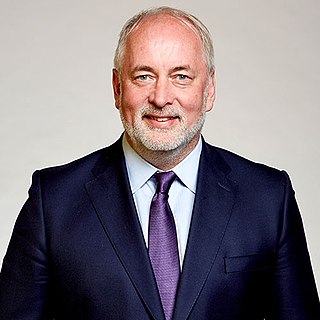
Nicholas Robert Jennings is a British computer scientist and the current Vice-Chancellor and President of Loughborough University. He was previously the Vice-Provost for Research and Enterprise at Imperial College London, the UK's first Regius Professor of Computer Science, and the inaugural Chief Scientific Adviser to the UK Government on National Security. His research covers the areas of AI, autonomous systems, agent-based computing and cybersecurity. He is involved in a number of startups including Aerogility, Contact Engine, Crossword Cyber Security, and Reliance Cyber Science. He is also an adviser to Darktrace, a member of the UK Government's AI Council, chair of the National Engineering Policy Centre and a council member for the Engineering and Physical Sciences Research Council.
Radhika Nagpal is an American computer scientist and researcher in the fields of self-organising computer systems, biologically-inspired robotics, and biological multi-agent systems. She is the Fred Kavli Professor of Computer Science at Harvard University and the Harvard School of Engineering and Applied Sciences. She is also a Core Faculty Member of the Harvard Wyss Institute for Biologically Inspired Engineering. In 2017, Nagpal co-founded a robotics company under the name of Root Robotics. This educational company works to create many different opportunities for those unable to code to learn how.
Alcherio Martinoli is a roboticist and an associate professor at the École polytechnique fédérale de Lausanne (EPFL) in the School of Architecture, Civil and Environmental Engineering where he heads the Distributed Systems and Algorithms Laboratory.
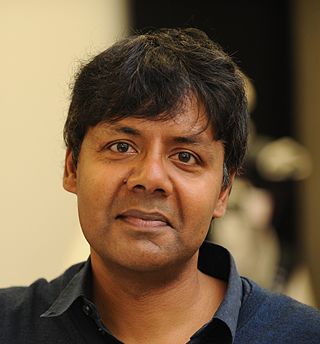
Sethu Vijayakumar FRSE is Professor of Robotics at the University of Edinburgh and a judge on the BBC2 show Robot Wars. He is the Programme co-Director for Artificial Intelligence at The Alan Turing Institute, the UK's National Institute for Data Science and Artificial Intelligence, with the responsibility for defining and driving the institute's Robotics and Autonomous Systems agenda. He co-founded the Edinburgh Centre for Robotics in 2015 and was instrumental in bringing the first NASA Valkyrie humanoid robot out of the United States of America, and to Europe, where is it a focus of research at the School of Informatics. He was elected as a Fellow of the Royal Society of Edinburgh in 2013.

Jan Peters is a German computer scientist. He is Professor of Intelligent Autonomous Systems at Department of Computer Science of the Technische Universität Darmstadt.

Louis Barry Rosenberg is an American engineer, researcher, inventor, and entrepreneur. He researches augmented reality, virtual reality, and artificial intelligence. He was the Cotchett Endowed Professor of Educational Technology at the California Polytechnic State University, San Luis Obispo. He founded the Immersion Corporation and Unanimous A.I., and he wrote the screenplay for the 2009 romantic comedy film, Lab Rats.
Lynne Edwards Parker is deputy chief technology officer and director of the National Artificial Intelligence Initiative Office at the United States Office of Science and Technology Policy. She is an American roboticist specializing in multi-robot systems, swarm robotics, and distributed artificial intelligence. As well as working in the US Government, she holds a position as professor of electrical engineering and computer science at the University of Tennessee.













